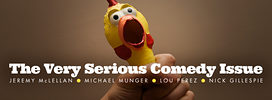Lead Essay
Jeremy McLellan explains why we’ll always have comedy, and why it will always make people uncomfortable. In politics, comedy tends to expose the cracks in the system, the people, practices, and situations that even autocrats can’t control. The social rules that we set for ourselves are never complete; our control of the world is never perfect. Comedians are ambassadors from a world of chaos. That is… they are ambassadors from reality.
Response Essays
Lou Perez describes a different problem that comedians can face: the audience who agrees with them too much. When comedy gets political, which sometimes it will, there’s a great danger of coasting on shared assumptions and beliefs, and not actually being funny. That danger is just as real when libertarians take the stage as when anyone else does. Comedy might be a mirror held up to the powerful, but that mirror needs to be turned on the audience sometimes too.
Michael Munger discusses his experiences running for governor of North Carolina, including an incident with a hot mic that he describes as his finest moment. Candidates, he suggests, are not supposed answer questions or talk policy; they are there to bicker. Too-frank talk about policy or the difficult choices needed to govern will have a result for them that’s similar to what bad comedians suffer on stage. Misdirection, cunning, and courage are sometimes needed to get people to see what’s all around them.
Nick Gillespie dismisses the idea that comedy - or any art form, really - exists with the higher purpose of doing anything socially subversive and therefore redeeming. This, he says, is a romantic myth. In reality, comedy is shot through with in-group virtue signaling. This is much like all art, and most of the rest of what we do besides. Comedy usually just shows that you’re the right sort of person, and that you fit in with the right sort of group. Once we let go of our idealism on that score, we can perhaps get down to the work of changing how people think, using both comedy and other forms of expression. But let’s not have any illusions about it.
Coming Up
Discussion through the end of the month.

